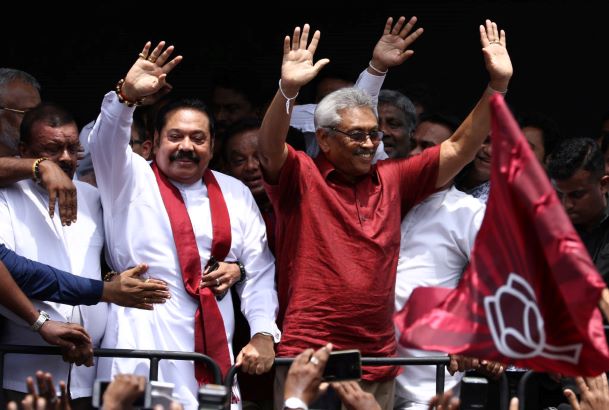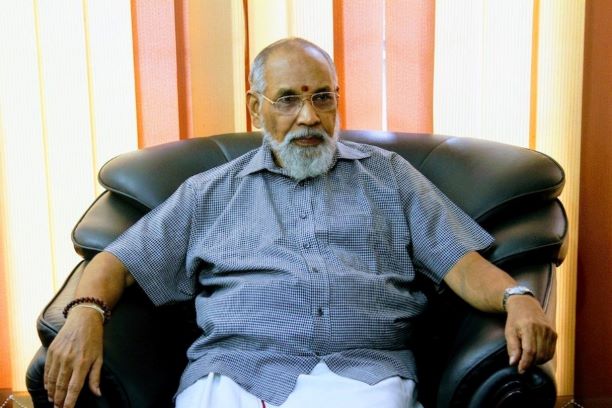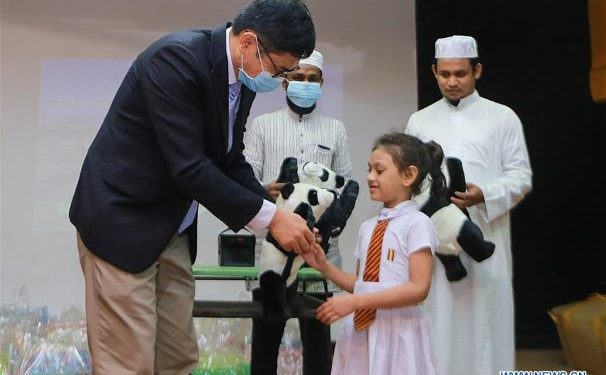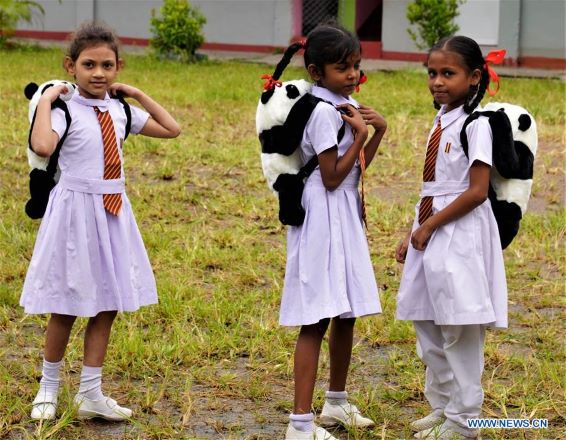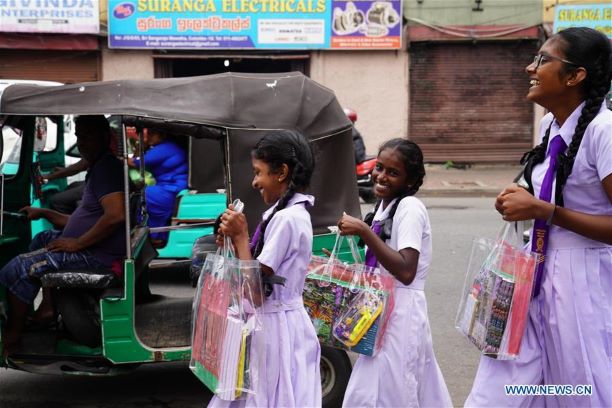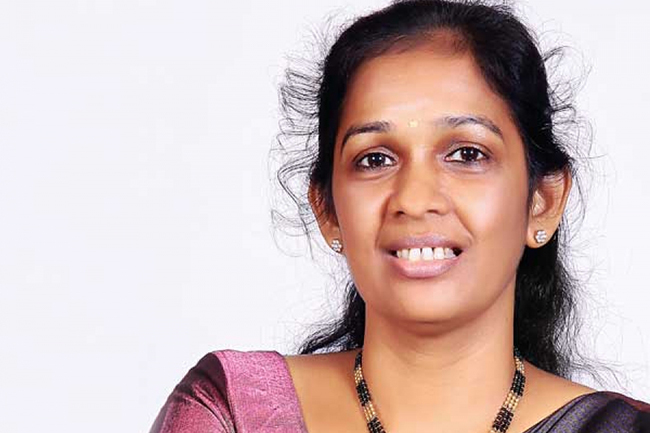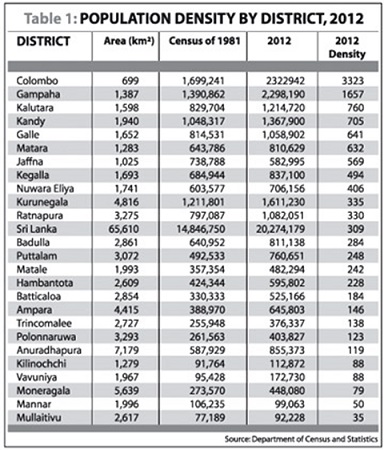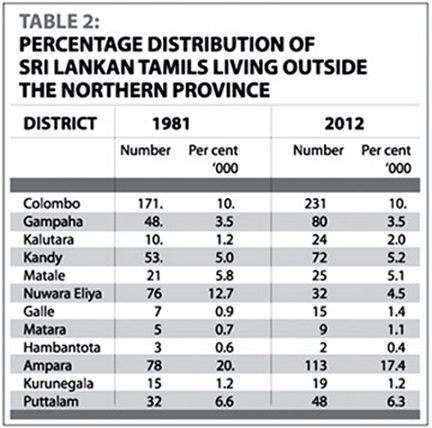Wiggy stop stoking communal tension
September 6th, 2020Asoka Weerasinghe (Mr.) Kings Grove Crescent . Gloucester . Ontario . Canada
5 September 2020
Mr. C.V. Wigneswaran
Leader, TAMIL MAKKAL THERSIYA KUTTANI
Sri Lanka Parliament
Kotte
Sri Lanka
Dear Mr. Wigneswaran (Wiggy):
What’s going on Wiggy? You have exposed yourself indirectly that you bombed your Grade 8 Ceylon History’ subject and failed it miserably, at Royal College, by giving a helluva-go to usurp the Wanniyalaeto (Veddha) community’s rightful place as the indegenous peoples of Ceylon on behalf of your Tamils. You bluntly say that you Tamils were the first indigenous people that walked on the kabook earth of Sri Lanka. Prove it Wiggy. Let us read your thesis. Give me/us a break.
Sheesh…..come again, Wiggy! What a string of masala wade, with little shrimps fried painfully curled on top that I see around your neck. You have shown me how bankrupt you Tamils are.
Wanting to own a few hectares of the best real estate of toddy-palm country saying to the world – “see there is no one else living here, other than us Tamils.” So you sweep to ethnic cleanse the land not with eikle brooms but with hand grenades, kalashnikovs, live bullets and machetes and then tell the world, “we were also the indigenous peoples who lived in the North and East among the snakes, elephants, sloth bears, leopards, mosquitoes and no one other human being. And we also speak the oldest language in the world –Tamil. Whoopee-do!
How you Tamil-nasties, ethnic-cleansed the North, by kicking out between 1971 and 1981, 27,000 Sinhalese who lived in the North for generations. Then stoned and chased 400 Sinhalese lecturers and undergraduates in October 1977 from the Jaffna campus, who were brought in a convoy of buses escorted by the army and police under a hail of missiles of rocks and stones. Now you are telling that you were the first people in the North under the scorching Jaffna-Kilinochchi sun.
What a way to own a piece of land to call it your mono-ethnic-racist- separatist Tamil state , Eelam. I say, “Boo! Bully You,” to the separatist Tamils.
As for the Indigenous Veddas, let me tell you where I am coming from when I defend their place in Sri Lanka’s Human- history and their dignity.
Wiggy, I have an immense affection for indigenous peoples who were given a bad rap by the invaders, especially the white-man. It was in 1970 that I was employed by Canada’s National Museums Corporation in Ottawa, to help build 15 brand-new Exhibition Halls at the Victoria Memorial Museum. Four of them were of the Indigenous peoples. The People of the LongHouse (Iroquois Indians); The Buffalo Hunters (Plains Indians); Inuit (The Eskimos) and The Children of the Raven (West Coast Cultures like the Haida).
I knew nothing about them when I started on the job. But I read about them , understood them. and I met them. I grew a great affinity towards them and developed a great sympathy for them. They commanded my respect, and believe me I gave them back their dignity and the rightful place in Canadian Human History in the National Museum of Man for every visitor to read.
And you take my word Wiggy. Unless you know the truth about our Indigenous peoples, the Veddhas, I want you to take a step back, and zip up your lips. You are not going to destroy the dignity of these beautiful indigenous Wanniyalaetoes of ours. You bet, you will hear from me as often, like the Kataragama coconut-bashing-cracks when cracking the nuts, to break all negative qualities to find a new pure soul with all goodness, as you sure need it. You bet.
Wiggy, I have now added, you, C.V.Wigneswaran as another bankrupt Tamil-politician “a crap-shooter through the eye of a needle” trying to gain prominence as a legitimate Tamil in my Motherland , Sri Lanka. Your name is behind Appapillai Amirthlalingam’s in my records who got caught as a God-damn liar when he told to some Canadian parliamentarians in the late 1980s, when he swore to Robert Wenman the Conservative MP for Fraser Valley in British Columbia, that , “We Tamils never asked for a separate State, carved out of the North and East of Sri Lanka.” I huffed and I puffed and told Robert, I don’t believe you. I doubt Amirthalingam would ever say that.
“Asoka, I got him recorded on tape. Come home and I will show it to you”
So I went to Robert Wenman’s home at Hog’s Back the following evening. He took me to his basement and ran the VHS tape projecting the image onto a white wall. And there was Amirthalingam standing in his white vetti, and uttering those words with all honesty and innocence as a celestial seraph. “Robert, this rascal is an unconscionable liar. I will bring you some material published in black and white to prove that I am right when I call him a “Bloody uncouth liar”. And I will come by you two evenings later and you tell me what you concluded about this Tamil politician who is lobbying for their Eelam and introduced by the Canadian Speaker of the House of Commons to the MPs. and he takes a bow of honour standing in the gallery.”
Well…well…Wiggy, the final outcome was, Robert Wenman, the Conservative MP for Fraser Valley in British Columbia tells me, “Asoka I am very embarrassed. I want to tell you truthfully, that this guy took us down the garden path into a black Hell-hole. I apologize to all you Sinhalese-Canadians for commenting on this issue without making an effort to understand their cunning when lobbying for my support. I took copies of what you gave me and distributed among a few of my colleagues, who have now got quite a different notion of these Tamil separatists in Canada. They are frauds!”
This stupid, unsophisticated, humbuggery, and crude act will tell the world that your racist disingenuous Tamil politicians would stoop low to anything to claim that the northern hectares of the best realestates of toddy-palm country were yours, the Tamils. What poppycock,Wiggy. What stinking barrels of jardi!
Here is a story, that you may not know whether to laugh at, or cry or look up and spit at yourself, ashamed of being made to look a stupid Tamil by your own people. Ha! and a former Supreme Court Justice.
Let me roll back the years to 1986. The month was September, and the day, Sunday the 21st. It was around 8:30 in the evening and the place was a small bungalow in Vanier, East Ottawa, and the address was 405 Dollard Street.
That was the day when Ronald Regan (Republican) was President of the US; and Margaret Thatcher was Prime Minister of the UK. That was the day when most of Sri Lanka’s cricket hungry people were rooting for your Mother-India, to win the First Cricket Test against Australia, and let off a great sigh of relief when the match was tied at the end. Australia First Innings (574 – 7 dec. Dean Jones 210, David Boon 122) & Second Innings ( 170 – 5 :David Boon 49) vs India First Innings 397 (Kapil Dev 119) & 347 (Sunil Gaveshkar 90). Tied.
That was the evening when Yours truly was interviewed and recorded on camera by Robin Benger, for the CBC’s National on Sri Lanka’s High Commissioner, former Sri Lanka’s Army Commander, “Bull” Weeratunga, who was hounded day in and day out, as a Tamil torturer by the Ottawa Tamil separatists, led by the Roman Catholic priest from Vuvuniya, a Tamil, Fr. Philip Ratnapala, in a black cassock with his white collar starched towards heaven.
After the almost one-hour interview was recorded and the camera was switched off and on his way out of the door Robin turned to me and asked, “So I will see you tomorrow morning, won’t I”).
“Why should I Robin, what is going on?” “Why, don’t you know. They are flying over a Tamil refugee from Paris, a Baby Para (Pararajasegaram) who says that the former Army Commander “Bull” Weeratunga, the present High Commissioner for Sri Lanka in Canada, supervised when he was tortured by the army soldiers. There will be a Press Conference tomorrow (Monday, Sept. 22) morning at the Holiday Inn on Queen Street/Kent Street at 10 in the morning.” And he gave me the room number.
“Robin, I will make an effort to be there” was my response.
Knowing that I will be confronted by Philip Rathnapala who hated my guts, I asked Lionel Edirisinghe, a dear friend of mine, who worked close to the Holiday Inn, whether he could join me in this venture. “Sure”, he said. “Let’s meet at the Holiday Inn’s foyer at 9:55 in the morning and walk up. Lionel all what I want you to do for me is that, if I am beaten up by the Tamils and taken to Hospital, please call Jeannie at work and tell her what happened and that I am in hospital. Here’s her office telephone number, 613-995-xxxx.”
On Monday morning, at 9:55 I was in the Foyer of the Holiday Inn. Lionel hadn’t arrived, and I walked up to the room where the Press Conference was going to take place. The room was chocker- block full of media people, with video cameras, boom microphones and handheld mics et cetera. Father Philip Ratnapala in a black suit wearing a clerical shirt fitted with a white collarino starched towards heaven was sitting at a table near the entrance. Beside Ratnapala was an Asian looking man sitting beside him who I presumed was Pararajasegaram. No sooner Philip spotted me, he pointed his finger at me and told his security men, “I don’t want him here. He is not a media reporter.”
Two burly Tamils crowded me. and held onto my upper arms. Wiggy, I never liked intimidation, specially when it happens to be from Tamils. No bloody way. Since it was an open meeting I looked at these two burly Tamils and said, “Yes, I am from the media reporting for a Sri Lanka paper.” “Show me your credentials” spoke Ratnapala.
No sooner did I start to fumble my pockets in search of a non-existent media card, Dr. Elugupillai a nuclear-physicist, the head honcho of the Eelam separatist movement in Ottawa, walked in. Seeing the commotion he wanted to know what was going on. The cameras focused on me and started to roll. Elagu was told by Ratnapala that he did not want me in the room, Elagu placed his right arm on my shoulders and said, “No, Asoka can stay”, and walked me into the room. Although Elagu and I were antagonists, we were civil to each other, and I liked him in a funny sort of a way. I will certainly break bread anytime with him.
Lionel Edirisinghe walked into the room about 20 minutes after the Press Conference started.
Wiggy, this Press Conference was a sham, a Canadian-Tamil Blaney Gong Show of Tamil Humbugs. One more proof positive that you Tamils were bankrupt, unable to prove that you all had every right, ethnologically, ethnographically, historically, archaeologically, anthropologically that the North and East, toddy-palm country’s best real estate belonged to you Tamils. Wiggy, you know as well as I know, that you Tamils don’t have a snowball chance in hell to prove it.
After about 40 minutes into the press conference, I walked out in disgust, and Lionel followed me. Five reporters came running after us and caught up with us by the elevator.
“Who are you Sir, why are you leaving, are you Sinhalese, Sir”, were some of the questions thrown at us.
“I am Asoka Weerasinghe, and he is Lionel Edirisinghe. We are leaving with absolute disgust. All what you heard from these Tamils were complete lies. All of them who spoke to you were humbugs. And we are not Sinhalese and both of us are Canadians.”
Listen Wiggy, switch on your hearing aids, as I want you to hear the rest of my story clearly. As it will prove to you that you Tamil separatists are crass-puss-vedilla -liars, and God damn Humbugs to boot. And you Wiggy, the Justice of the Supreme Court, and the former Chief Minister of the mainly Tamil Northern Province should be ashamed of yourself. And if I were you, I would rub off that red third eye of yours that clearly identifies you as a Tamil.
Around 3:30 that afternoon the phone in my office rang. And the caller says – “Sir, may I speak with Mr. Asoka Weerasinghe.” “Yes, this is he.” “Mr. Weerasinghe, I am Dan Ledger, a senior reporter for the Canadian Press.
Will it be possible for me to meet up with you to get a handle on the High Commissioner “Bull” Weeratunga story, that he is a Tamil torturer, and your take on Baby Para’s torture story. I saw you at the Press Conference this morning, and Victor Parson’s our Deputy Bureau Chief, told me that if I want to find out the true story, speak with Asoka Weerasinghe as he will tell you the facts and truthfully.”
So we met at noon the following day at the Japanese Village on Kent Street. “Make a note of the following information which will destroy any credibility you Tamils ever had. Wiggy.” During our conversation I asked, “Dan, did you wonder what the heck was going on at the Press Conference. You reporters ask Baby Para a two sentence question in English. These two sentences in English were translated into Tamil by a translator in three sentences. Baby Para responds to the three Tamil sentence question, in Tamil in four sentences. And those four Tamil sentences were translated for the media’s ears in English in 25 to 30 sentences. And it happened every time. Did you notice that, Dan? As if they had a planned script of their story, hoping that it would pick up ink as a news story in the newspapers the following morning. A news story crucifying High Commissioner ‘Bull’ Weeratunga as a Tamil torturer, violating codes of Human Rights. And hoping that it would have been a good reason for Canada to declare him a persona non grata and getting him recalled. Thus embarrassing Sri Lanka and her Foreign Ministry. Hmmmm…cunning rascals.” Lucky for Sri Lanka, that happened to be a “Puus vedilla.”
“Funny you brought it up Asoka. After the Tamil press conference in Ottawa in the morning they had another one in Toronto in the evening. We sent our most senior reporter to cover it for Canadian Press. What transpired was the same. The final three sentences in Tamil by Baby Para, had a 30 sentences translation in English. And our reporter had found out that the Tamil translator couldn’t speak a word of Tamil.” “Forget it,” he reported back. It was a strange farce and a scam led by the Roman Catholic priest Philip Ratnapala. There won’t be a report on Baby Para’s intervention to nail Sri Lanka High Commissioner “Bull” Weeratunga, the former Army Chief as a torturer,” I was told.
That was it Wiggi. You are the legal man, the one time Supreme Court Justice. And I hope that you see what I see in those Tamil separatists…a bunch of Dodos…what an embarrassing bunch of morons, a bunch of arrack spiked-kanji drinking tipsy fools. Go figure that one out, Wiggy.
As that little bird that flew onto my windowsill and asked me…
“The little birdie with a yellow bill
sat upon my windowsill,
cocked his shining eye and said
about the separatist-Tamils
“What a bunch of pea-brain heads.”
So, I know…I know..Wiggy…when you Tamils are bankrupt you try any which way to claim the Northern Toddy-palm country hectares for your mono-ethnic, Tamil racist state, Eelam, that you will hold onto any weak straw to anchor yourself, and try any shenanigan, nevermind whether you look a bunch of fools and scammers. When you yourself suffer from a false historical perspective, it doesn’t look good for the future generations of your Tamil clan in Sri Lanka.
With the Baby Para’s laughable side cameo, in that bit of theatre, you all looked like clowns of the Chelva-Ponna Circus. Aren’t you getting tired of it. Haro..hara !
And here is my personal message to you Wiggy – I am a true Sinhalese patriot still romancing my Mother Lanka and still attached to her with the umbilical cord, and on a Mission in Canada. That no one, absolutely no one is going to harm her unfairly, and that includes You…So get off my back!
My advice to you Wiggy, is to take a step back, and cut your mythical dream of living in your Eelam inside the island of Sri Lanka.
Be safe, and do wear a mask when you step out of your house.
Sincerely,
Asoka Weerasinghe (Mr.)

